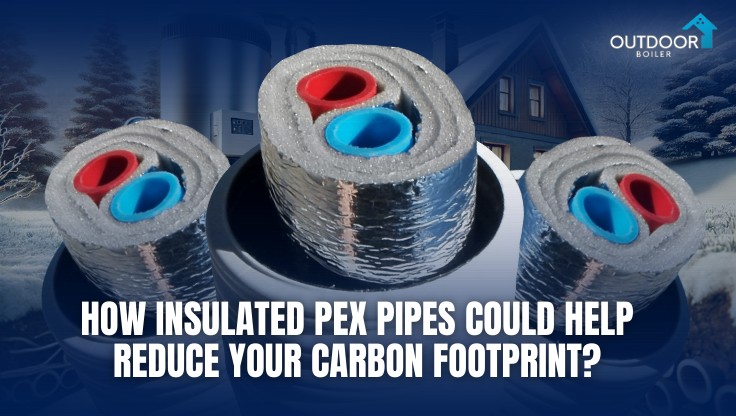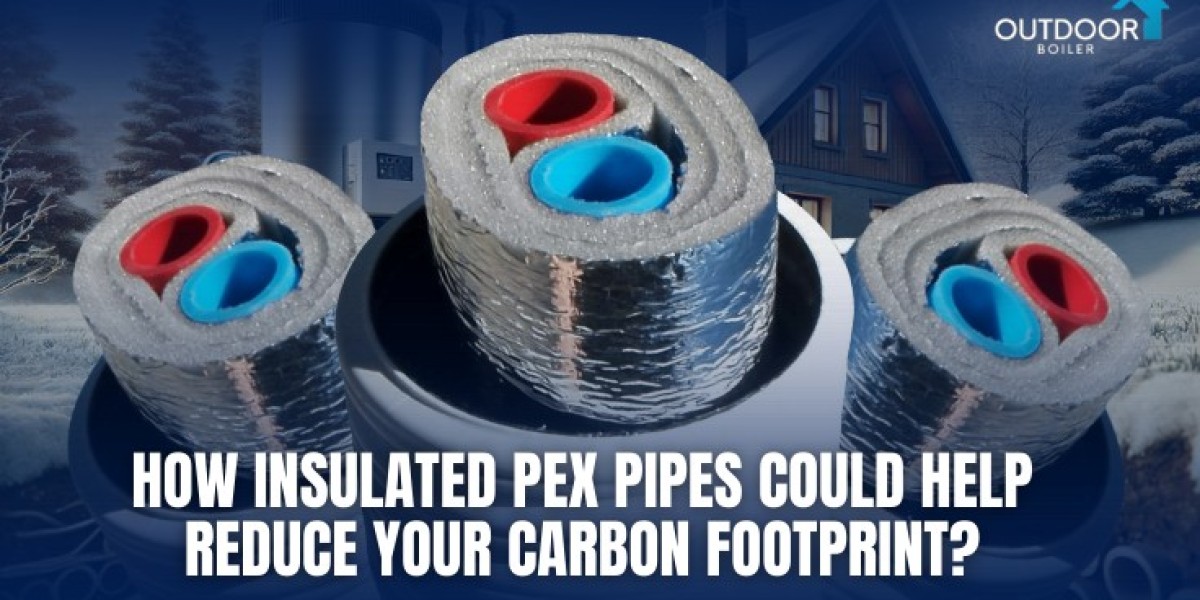
The push to sustainable and eco-friendly heating solutions is ever-growing because of the increasing global consciousness about climate change. Among the most significant contributors of a building's carbon footprint through fuel consumption and energy use are heating systems, and outdoor boilers are no exception.
One of the new developments in heat management is the insulated PEX pipe. This technology aids in achieving energy efficiency and also reduces greenhouse gas emissions. This article attempts to present the scientific aspect of insulated PEX pipe, considering its design and functionality for fuel conservation, reduced emissions, and environmental sustainability.
1. Heat Transfer and Energy Efficiency in Outdoor Boiler Systems
Heat transfer is one of the significant efficiency factors in any heating system. Uninsulated pipes allow the boiler to heat leak out into the environment, especially when it is buried underground. This causes lower water temperatures to arrive at the target location; thus, the boiler needs to work harder to keep up with consistent heating levels. Further, this burns more fuel, and hence, the energy consumption and emissions increase.
Insulated PEX pipe, however, is designed in a way that meets the challenge as a thermally efficient barrier. High insulation of insulated PEX minimizes the transfer of thermal energy from hot water inside the pipe to a colder environment outside. Such efficiency reduces the workload on the boiler, saves fuel, and subsequently decreases emissions from burning wood, coal, or oil.
2. Role of Insulated PEX in Fuel Saving
A significant environmental benefit for insulated PEX is savings in fuel. Insulated pipes lose a lot of heat, especially in cold areas, and can lose 10-30% more at longer runs. This makes for higher fuel consumption as the boiler has to pump hard to maintain the temperature all the way through the water pipes.
Low-thermal-conductivity closed-cell insulation prevents the heat from being transferred. That means that the water is leaving the building warmer than it arrived; fewer heating cycles are needed, thus less fuel consumption by the boiler. According to different conditions and installation length as well as climate, a reduction in fuel consumption using insulated PEX is up to 20-30%. Such demand reduction automatically translates to lower carbon emissions.
3. Lower Emissions Because of Lower Boiler Operation
The generation of heat by burning fuel and air emits carbon dioxide (CO₂), methane (CH₄), and a long list of other greenhouse gas emissions that cause global warming. Since most of the heat loss occurs through insulated PEX lines, outdoor boilers operate only when absolutely necessary and only for short periods. By reducing the time the unit is operating, the amount of the total emissions in the environment is reduced significantly.
According to a U.S. Department of Energy study, small differences in the amount of insulation on a heating system result in big reductions in CO₂ emissions. An insulated PEX system versus uninsulated piping in the same applications can yield an emission reduction of 15-25%. For the environmentally conscious consumer, it translates into reduced fuel costs and alignment with the greater goal of minimizing carbon emissions from home heating.
4. Comparison: Insulated PEX Vs. Non-Insulated Traditional Piping Materials
Conventional piping materials, including either metal or PVC for boiler applications, are characterized with higher thermal conductivity and offer no inherent insulating capability. These piping materials facilitate faster flow of heat to the surroundings, leading to a resultant energy loss from the pipe due to the mechanism of heat transfer. In this regard, PEX, being a polymer material, is composed naturally of low thermal conductivity and hence exhibits a minimal tendency towards heat transfer. Besides, high-quality insulation put around the PEX pipe covers it with multi-layer heat loss.
For example, a comparative study shows that insulated PEX systems have a heat loss rate of about 50% less than that of conventional piping systems under similar conditions. This means that such energy-saving ability directly translates to less fuel consumption, reduced emissions, and longer boiler life, which means that insulated PEX is more sustainable and environmentally friendly.
5. The Science Behind Insulation: Thermal Resistance and Energy Conservation
PEX pipes have closed-cell foam insulation. Closed-cell foam insulation provides a form of "thermal resistance," or R-value. The higher the R-value, the more the material will insulate. Among the materials most frequently used to insulate, closed-cell foam insulation possesses one of the highest R-values. Consequently, closed-cell foam does an excellent job of holding heat within the pipe.
Hot flowing water inside insulated PEX is insulated because of a high R-value foam which cuts the conduction of thermal value from water towards the surroundings. Therefore, insulated PEX will keep conserving this already expended thermal energy from heating water for longer hours without dissipation of these energy reserves to the outer environment. Consequently, a much lesser amount of energy coupled with reduced amount of fuel usage occurs; and accordingly a lesser amount of negative contribution towards environmental effects.
6. Long lifetime of the equipment with minimal waste
Another often overlooked benefit of insulated PEX piping is that it extends the life of boiler equipment. Continuous cycling and high operating stress speed up the degradation of boiler parts, which means increased maintenance and eventually premature replacement. The longer the boilers work without heat loss because of the insulated PEX, the less wear and tear they experience and hence last longer.
From an environmental perspective, longer equipment life means the need for less production of new boilers. This usually takes energy-consuming processes and the extraction of resources. Lower replacements also mean lower waste generation and lower emissions in manufacturing as part of sustainable principles and total carbon footprint in heating systems.
7. Cumulative Environmental Benefits of Insulated PEX Pipe for Outdoor Boiler Systems
The cumulative environmental benefits of using insulated PEX pipe with outdoor boiler systems are considerable:
Lower fuel consumption: The insulation in PEX reduces heat loss, thus the boilers will work efficiently, reduce fuel consumption, and subsequently decrease the emission of greenhouse gasses as well.
Less emission: Boiler operation becomes less frequent; hence, CO₂ and other pollutants emissions reduce the amount of pollutants released into the atmosphere, leading to clean air and lesser impacts on global warming.
Sustainable Materials and Insulation: Low-conductivity materials and high R-value insulation in PEX pipes save energy, making the heating system more sustainable.
Longer Boiler Life: Insulated PEX minimizes strain on boiler systems because it helps extend equipment lifespan and reduces the time taken in boiler replacements and environmental burden of manufacturing new equipment.
Conclusion: Choose Insulated PEX as Your Sustainable Heating Solution
The ability of insulated PEX to conserve energy by minimizing the emission of pollutants and harmful gasses in heating systems promotes eco-friendly heating practices that are essential in environmental conservation and protection. To maximize heating efficiency for environmentally conscious individuals while contributing to greater efforts against climate change, investing in insulated PEX is indeed the best step.
A very practical yet impactful choice in going completely green with heating would be insulated PEX pipes. This may help decrease the amount of fuel demanded, lessen the emission quantity, and lengthen the life span of all the equipment to come up with a pretty intelligent solution on balancing warmth demand with environmental conscience.
Looking for eco-friendly pipes? Visit OutdoorBoiler.com and upgrade your pipes today!



